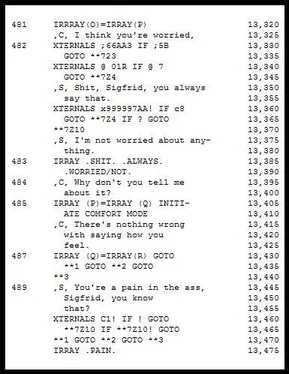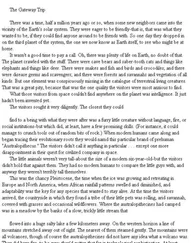When men began to poke around the surface of Venus they found the Heechee diggings.
They didn’t find any Heechees. Whoever the Heechees were, whenever they had been on Venus, they were gone. Not even a body was left in a burial pit to exhume and cut apart. All there was, was the tunnels, the caverns, the few piddling little artifacts, the technological wonders that human beings puzzled over and tried to reconstruct.
Then somebody found a Heechee map of the solar system. Jupiter was there with its moons, and Mars, and the outer planets, and the Earth-Moon pair. And Venus, which was marked in black on the shining blue surface of the Heechee-metal map. And Mercury, and one other thing, the only other thing marked in black besides Venus: an orbital body that came inside the perihelion of Mercury and outside the orbit of Venus, tipped ninety degrees out of the plane of the ecliptic so that it never came very close to either. A body which had never been identified by terrestrial astronomers. Conjecture: an asteroid, or a comet — the difference was only semantic — which the Heechees had cared about specially for some reason.
(Transcript of Q. A., Professor Hegramet’s lecture.)
Q.What did the Heechee look like?
Professor Hegramet:Nobody knows. We’ve never found anything resembling a photograph, or a drawing, except for two or three maps. Or a book.
Q.Didn’t they have some system of storing knowledge, like writing?
Professor Hegramet:Well, of course they must have. But what it is, I don’t know. I have a suspicion… well, it’s only a guess.
Q.What?
Professor Hegramet:Well, think about our own storage methods and how they would have been received in pretechnological times. If we’d given, say, Euclid a book, he could have figured out what it was, even if he couldn’t understand what it was saying. But what if we’d given him a tape cassette? He wouldn’t have known what to do with it. I have a suspicion, no, a conviction, that we have some Heechee “books” we just don’t recognize. A bar of Heechee metal. Maybe that Q-spiral in the ships, the function of which we don’t know at all. This isn’t a new idea. They’ve all been tested for magnetic codes, for microgrooves, for chemical patterns- nothing has shown up. But we may not have the instrument we need to detect the messages.
Q.There’s something about the Heechee that I just don’t understand. Why did they leave all these tunnels and places? Where did they go?
Professor Hegramet:Young lady, it beats the piss out of me.
Probably sooner or later a telescopic probe would have followed up that clue, but it wasn’t necessary. Then The Famous Sylvester Macklen — who wasn’t up to that point the famous anything, just another tunnel rat on Venus — found a Heechee ship and got himself to Gateway, and died there. But he managed to let people know where he was by cleverly blowing up his ship. So a NASA probe was diverted from the chromosphere of the sun, and Gateway was reached and opened up by man.
Inside were the stars.
Inside, to be less poetic and more literal, were nearly a thousand smallish spacecraft, shaped something like fat mushrooms. They came in several shapes and sizes. The littlest ones were button-topped, like the mushrooms they grow in the Wyoming tunnels after they’ve dug all the shale out, and you buy in the supermarket. The bigger ones were pointy, like morels. Inside the caps of the mushrooms were living quarters and a power source that no one understood. The stems were chemical rocket ships, kind of like the old Moon Landers of the first space programs.
No one had ever figured out how the caps were driven, or how to direct them.
That was one of the things that made us all nervous: the fact that we were going to take our chances with something nobody understood. You literally had no control, once you started out in a Heechee ship. Their courses were built into their guidance system, in a way that nobody had figured out; you could pick one course, but once picked that was it — and you didn’t know where it was going to take you when you picked it, any more than you know what’s in your box of Cracker-Joy until you open it.
But they worked. They still worked, after what they say is maybe half a million years.
The first guy who had the guts to get into one and try to start it up succeeded. It lifted out of its crater on the surface of the asteroid. It turned fuzzy and bright, and was gone.
And three months later, it was back, with a starved, staring astronaut inside, aglow with triumph. He had been to another star! He had orbited a great gray planet with swirling yellow clouds, had managed to reverse the controls — and had been brought back to the very same pockmark, by the built-in guidance controls.
So they sent out another ship, this time one of the big, pointy morel-shaped ones, with a crew of four and plenty of rations and instrumentation. They were gone only about fifty days. In that time they had not just reached another solar system, they had actually used the lander to go down to the surface of a planet. There wasn’t anything living there… but there had been.
They found the remnants. Not a lot. A few beat-up pieces of trash, on a corner of a mountaintop that had missed the general destruction that had hit the planet. Out of the radioactive dust they had picked up a brick, a ceramic bolt, a half-melted thing that looked as though it had once been a chromium flute.
Then the star rush began… and we were part of it.
Sigfrid is a pretty smart machine, but sometimes I can’t figure out what’s wrong with him. He’s always asking me to tell him my dreams. Then sometimes I come in all aglow with some dream I’m positive he’s going to love, a big-red-apple-for-the-teacher kind of dream, full of penis symbols and fetishism and guilt hang-ups, and he disappoints me. He takes off on some crazy track that has nothing at all to do with it. I tell him the whole thing, and then he sits and clicks and whirs and buzzes for a while — he doesn’t really, but I fantasize that while I’m waiting — and then he says:
“Let’s go back to something different, Rob. I’m interested in some of the things you’ve said about the woman, Gelle-Klara Moynlin.”
I say, “Sigfrid, you’re off on a wild-goose chase again.”
“I don’t think so, Rob.”
“But that dream! My God, don’t you see how important it is? What about the mother figure in it?”
“What about letting me do my job, Rob?”
“Do I have a choice?” I say, feeling sulky.
“You always have a choice, Rob, but I would like very much to quote to you something you said a while ago.” And he stops, and I hear my own voice coming out of somewhere in his tapes. I am saying:
“Sigfrid, there’s an intensity of pain and guilt and misery there that I just can’t handle.”
He waits for me to say something.
After a moment I do. “That’s a nice recording,” I acknowledge, “but I’d rather talk about the way my mother fixation comes out in my dream.”
“I think it would be more productive to explore this other matter, Rob. It is possible they’re related.”
“Really?” I am all warmed up to discuss this theoretical possibility in a detached and philosophical way, but he beats me to the punch:
“The last conversation you had with Klara, Rob. Please tell me what you feel about it.”
“I’ve told you.” I am not enjoying this at all, it is such a waste of time, and I make sure he knows it by the tone of my voice and the tenseness of my body against the restraining straps. “It was even worse than with my mother.”
Читать дальше












